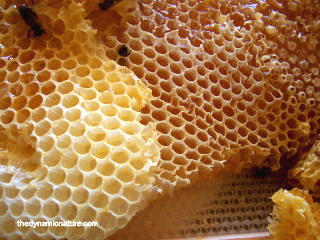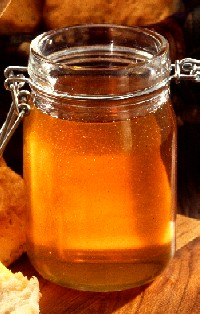Honey - Antioxidant - Antibiotic
Honey is known for more than 2000 years and is collected from honey bee hives. Its antioxidant and antibiotic properties are useful in many home remedies. The nectar of the flowers is, a sweet substance naturally occurring, to attract insects for the pollination of the plants.The honey bees after collecting the nectar modify and store it in the bee-hives as honey.
The stored nectar is utilized when its availability is scarce due to seasonal and weather conditions.
These bees feed on nectar and after returning to hive regurgitate it a number of times partially digesting it before depositing it in the honeycomb.
By fanning the hive with their wings the bees raise sugar concentration of the half-digested nectar by evaporating much of the water in it.
Ripe honey collected from the hive, because of its high concentration of sugars and very less available water, does not ferment when sealed to protect from moisture.
It is sweet because it contains glucose, fructose and monosaccharide.

Nutritional profile
Honey primarily is a solution of carbohydrates in water. It also contains a wide range of vitamins including riboflavin, niacin and pantothenic acid.It is also rich in minerals like copper, calcium, iron, magnesium, phosphorus, manganese, zinc and potassium.
Antioxidants
Honey contains a number of phenolic acids and flavonoids which act as antioxidants.Darker honeys are believed to have higher antioxidant content than lighter colored honeys.
Energy source
The natural sugars present in the honey are easily digested and absorbed by the body providing instant boost of energy which is long lasting.This effect is very useful for the athletes as its use before exercise not only gives energy for the action but also keeps him energized afterwards.
Beauty-care
Honey is hygroscopic attracting and retaining moisture. Because of this quality a number of moisturizing products for skin and hair use it as one of the ingredients.Honey being an anti-irritant is suitable for baby care products and products for sensitive skins.
Oral health
Containing a wide variety of antibiotics and antioxidants, honey is known to inhibit growth of various fungi and bacteria.Its antibiotic properties helps in the prevention and cure of various oral conditions including tongue and mouth ulcers and periodontal diseases.
Cough and sore throat
Honey is a known remedy and mild antibiotic for cough and sore throat. The antiseptic and antibiotic actions of honey help in treatment of laryngitis and sore throats.Wounds, burns, and sores
When honey is used topically on wounds and burns, by dilution with body fluids hydrogen peroxide is produced slowly acting as an antibiotic.It is found that large bed sores and diabetic ulcers heal with its topical treatment due to its antibiotic and antioxidant action.
Honey being hygroscopic draws a thin film of body fluid in between the dressing and healing tissue.
This also helps in the removal of dressing painlessly, without tearing the healing tissue.
|
| |||
|
| |||
|
| |||
|
| |||
|
| |||
|
| |||
|
| |||
|
| |||
|
| |||
The dynamic nature
Mahmood Syed Faheem

| Underweight | :below 18.5 |
| Normalweight | :18.5-24.9 |
| Overweight | :25-29.9 |
| Obesity | :above 30.0 |
Advertisement